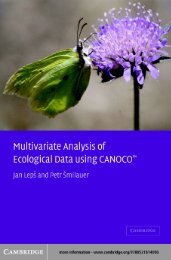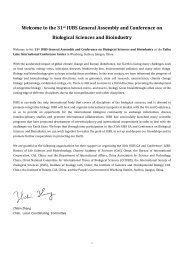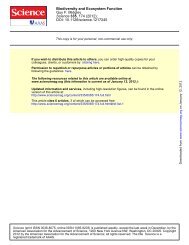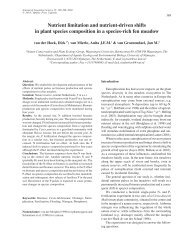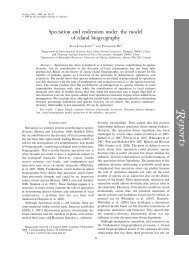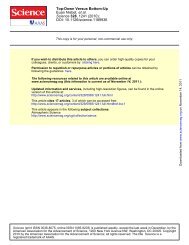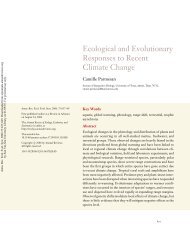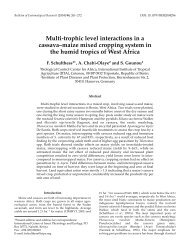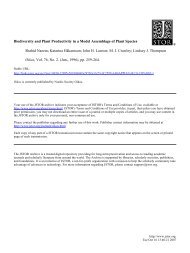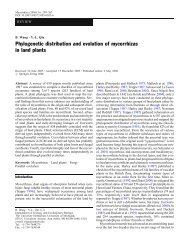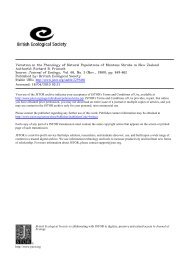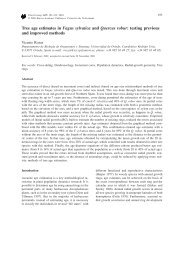- Page 1 and 2:
Ecological Studies,Vol. 193 Analysi
- Page 3 and 4:
W. Nentwig (Ed.) Biological Invasio
- Page 5 and 6:
Preface Yet another book on “Biol
- Page 7 and 8:
Contents 1 Biological Invasions: wh
- Page 9 and 10:
Contents 5 Waterways as Invasion Hi
- Page 11 and 12:
Contents Section III Patterns of In
- Page 13 and 14:
Contents Section IV Ecological Impa
- Page 15 and 16:
Contents 16.5.1 Genetic Differentia
- Page 17 and 18:
Contents XVII 19.4.5 Scenario Devel
- Page 19 and 20:
Contents XIX 23 Pros and Cons of Bi
- Page 21 and 22:
XXII Contributors Buschmann, Holger
- Page 23 and 24:
XXIV Contributors Nentwig, Wolfgang
- Page 25 and 26:
1 Biological Invasions: why it Matt
- Page 27 and 28:
Biological Invasions: why it Matter
- Page 29 and 30:
Biological Invasions: why it Matter
- Page 31 and 32:
Section I Pathways of Biological In
- Page 33 and 34:
2 Pathways in Animal Invasions Wolf
- Page 35 and 36:
Pathways in Animal Invasions 13 Ser
- Page 37 and 38:
Pathways in Animal Invasions 15 and
- Page 39 and 40:
Pathways in Animal Invasions 17 hou
- Page 41 and 42:
Pathways in Animal Invasions 19 (Eq
- Page 43 and 44:
Pathways in Animal Invasions 21 wat
- Page 45 and 46:
Pathways in Animal Invasions 23 2.3
- Page 47 and 48:
Pathways in Animal Invasions 25 adv
- Page 49 and 50:
Pathways in Animal Invasions 27 Lon
- Page 51 and 52:
30 I. Kowarik and M. von der Lippe
- Page 53 and 54:
32 I. Kowarik and M. von der Lippe
- Page 55 and 56:
34 I. Kowarik and M. von der Lippe
- Page 57 and 58:
36 I. Kowarik and M. von der Lippe
- Page 59 and 60:
38 I. Kowarik and M. von der Lippe
- Page 61 and 62:
40 3.4.2.1 Adhesion to Vehicles I.
- Page 63 and 64:
42 3.4.3 Role of Living Conveyers I
- Page 65 and 66:
44 I. Kowarik and M. von der Lippe
- Page 67 and 68:
46 I. Kowarik and M. von der Lippe
- Page 69 and 70:
4 Is Ballast Water a Major Dispersa
- Page 71 and 72:
Is Bllast Water a Major Dispersal M
- Page 73 and 74:
Is Bllast Water a Major Dispersal M
- Page 75 and 76:
Is Bllast Water a Major Dispersal M
- Page 77 and 78:
Is Bllast Water a Major Dispersal M
- Page 79 and 80:
60 B.S. Galil, S. Nehring, and V. P
- Page 81 and 82:
62 B.S. Galil, S. Nehring, and V. P
- Page 83 and 84:
64 B.S. Galil, S. Nehring, and V. P
- Page 85 and 86:
66 B.S. Galil, S. Nehring, and V. P
- Page 87 and 88:
68 B.S. Galil, S. Nehring, and V. P
- Page 89 and 90:
70 B.S. Galil, S. Nehring, and V. P
- Page 91 and 92:
72 B.S. Galil, S. Nehring, and V. P
- Page 93 and 94:
74 B.S. Galil, S. Nehring, and V. P
- Page 95 and 96:
Short Introduction Wolfgang Nentwig
- Page 97 and 98:
80 R.A. Hufbauer and M.E. Torchin s
- Page 99 and 100:
82 6.2 Hypotheses to Explain Biolog
- Page 101 and 102:
84 R.A. Hufbauer and M.E. Torchin e
- Page 103 and 104:
86 R.A. Hufbauer and M.E. Torchin l
- Page 105 and 106:
88 R.A. Hufbauer and M.E. Torchin (
- Page 107 and 108:
90 R.A. Hufbauer and M.E. Torchin i
- Page 109 and 110:
92 R.A. Hufbauer and M.E. Torchin h
- Page 111 and 112:
94 R.A. Hufbauer and M.E. Torchin B
- Page 113 and 114:
96 R.A. Hufbauer and M.E. Torchin T
- Page 115 and 116:
98 P. Pysšek and D.M. Richardson a
- Page 117 and 118:
100 P. Pysšek and D.M. Richardson
- Page 119 and 120:
102 P. Pysšek and D.M. Richardson
- Page 121 and 122:
104 P. Pysšek and D.M. Richardson
- Page 123 and 124:
106 P. Pysšek and D.M. Richardson
- Page 125 and 126:
108 P. Pysšek and D.M. Richardson
- Page 127 and 128:
110 P. Pysšek and D.M. Richardson
- Page 129 and 130:
112 P. Pysšek and D.M. Richardson
- Page 131 and 132:
114 7.3.1 Assumptions for Congeneri
- Page 133 and 134:
116 P. Pysšek and D.M. Richardson
- Page 135 and 136:
118 P. Pysšek and D.M. Richardson
- Page 137 and 138:
120 P. Pysšek and D.M. Richardson
- Page 139 and 140:
122 References P. Pysšek and D.M.
- Page 141 and 142:
124 P. Pysšek and D.M. Richardson
- Page 143 and 144:
8 Do Successful Invaders Exist? Pre
- Page 145 and 146:
Do Successful Invaders Exist? 129 F
- Page 147 and 148:
Do Successful Invaders Exist? 131 l
- Page 149 and 150:
Do Successful Invaders Exist? 133 T
- Page 151 and 152:
Do Successful Invaders Exist? 135 a
- Page 153 and 154:
Do Successful Invaders Exist? 137 b
- Page 155 and 156:
Do Successful Invaders Exist? 139 m
- Page 157 and 158:
Do Successful Invaders Exist? 141 R
- Page 159 and 160:
Short Introduction Wolfgang Nentwig
- Page 161 and 162:
148 M.L. Brooks ment practices desi
- Page 163 and 164:
150 M.L. Brooks direct additions to
- Page 165 and 166:
152 M.L. Brooks lerberg 1998, 2002;
- Page 167 and 168:
154 M.L. Brooks native plants, as d
- Page 169 and 170:
156 M.L. Brooks methods used to rem
- Page 171 and 172:
158 9.4.2 Effects of Vegetation Man
- Page 173 and 174:
160 M.L. Brooks potential associate
- Page 175 and 176:
162 M.L. Brooks Schmidt W (1989) Pl
- Page 177 and 178:
164 M. Scherer-Lorenzen, H. Olde Ve
- Page 179 and 180:
166 M. Scherer-Lorenzen, H. Olde Ve
- Page 181 and 182:
168 M. Scherer-Lorenzen, H. Olde Ve
- Page 183 and 184:
170 M. Scherer-Lorenzen, H. Olde Ve
- Page 185 and 186:
172 M. Scherer-Lorenzen, H. Olde Ve
- Page 187 and 188:
174 M. Scherer-Lorenzen, H. Olde Ve
- Page 189 and 190:
176 M. Scherer-Lorenzen, H. Olde Ve
- Page 191 and 192:
178 M. Scherer-Lorenzen, H. Olde Ve
- Page 193 and 194:
180 M. Scherer-Lorenzen, H. Olde Ve
- Page 195 and 196:
182 I. Kühn and S. Klotz who provi
- Page 197 and 198:
184 11.3 Case Studies on Ecosystem
- Page 199 and 200:
186 I. Kühn and S. Klotz fore, und
- Page 201 and 202:
188 I. Kühn and S. Klotz home soil
- Page 203 and 204:
190 I. Kühn and S. Klotz evolution
- Page 205 and 206:
192 I. Kühn and S. Klotz Similarly
- Page 207 and 208:
194 I. Kühn and S. Klotz To increa
- Page 209 and 210:
196 I. Kühn and S. Klotz Mack MC,
- Page 211 and 212:
198 W. Thuiller, D.M. Richardson, a
- Page 213 and 214:
200 W. Thuiller, D.M. Richardson, a
- Page 215 and 216:
202 W. Thuiller, D.M. Richardson, a
- Page 217 and 218:
204 W. Thuiller, D.M. Richardson, a
- Page 219 and 220:
206 W. Thuiller, D.M. Richardson, a
- Page 221 and 222:
208 W. Thuiller, D.M. Richardson, a
- Page 223 and 224:
210 W. Thuiller, D.M. Richardson, a
- Page 225 and 226:
Section IV Ecological Impact of Bio
- Page 227 and 228:
216 Section IV · Short Introductio
- Page 229 and 230:
218 H. Charles and J.S. Dukes proce
- Page 231 and 232:
220 H. Charles and J.S. Dukes can i
- Page 233 and 234:
222 H. Charles and J.S. Dukes Table
- Page 235 and 236:
224 H. Charles and J.S. Dukes tem p
- Page 237 and 238:
226 H. Charles and J.S. Dukes speci
- Page 239 and 240:
228 H. Charles and J.S. Dukes Table
- Page 241 and 242:
230 H. Charles and J.S. Dukes these
- Page 243 and 244:
232 H. Charles and J.S. Dukes (Micr
- Page 245 and 246:
234 H. Charles and J.S. Dukes ogist
- Page 247 and 248:
236 H. Charles and J.S. Dukes Geesi
- Page 249 and 250:
14 Biological Invasions by Marine J
- Page 251 and 252:
Biological Invasions by Marine Jell
- Page 253 and 254:
Biological Invasions by Marine Jell
- Page 255 and 256:
Biological Invasions by Marine Jell
- Page 257 and 258:
Biological Invasions by Marine Jell
- Page 259 and 260:
Biological Invasions by Marine Jell
- Page 261 and 262:
Biological Invasions by Marine Jell
- Page 263 and 264:
Biological Invasions by Marine Jell
- Page 265 and 266:
Biological Invasions by Marine Jell
- Page 267 and 268:
258 B. Baur and S. Schmidlin al. 20
- Page 269 and 270:
260 B. Baur and S. Schmidlin (Grand
- Page 271 and 272:
262 B. Baur and S. Schmidlin and C.
- Page 273 and 274:
264 B. Baur and S. Schmidlin others
- Page 275 and 276:
266 B. Baur and S. Schmidlin presen
- Page 277 and 278:
268 B. Baur and S. Schmidlin Straye
- Page 279 and 280:
270 References B. Baur and S. Schmi
- Page 281 and 282:
272 B. Baur and S. Schmidlin Riccia
- Page 283 and 284:
16 Hybridization and Introgression
- Page 285 and 286:
Hybridization and Introgression Bet
- Page 287 and 288:
Hybridization and Introgression Bet
- Page 289 and 290:
Hybridization and Introgression Bet
- Page 291 and 292:
Hybridization and Introgression Bet
- Page 293 and 294:
Hybridization and Introgression Bet
- Page 295 and 296:
Hybridization and Introgression Bet
- Page 297 and 298:
Hybridization and Introgression Bet
- Page 299 and 300:
Hybridization and Introgression Bet
- Page 301 and 302:
17 Genetically Modified Organisms a
- Page 303 and 304:
Genetically Modified Organisms as I
- Page 305 and 306:
Genetically Modified Organisms as I
- Page 307 and 308:
Genetically Modified Organisms as I
- Page 309 and 310:
Genetically Modified Organisms as I
- Page 311 and 312:
Genetically Modified Organisms as I
- Page 313 and 314:
Genetically Modified Organisms as I
- Page 315 and 316:
Genetically Modified Organisms as I
- Page 317 and 318:
Genetically Modified Organisms as I
- Page 319 and 320:
Section V Economy and Socio-Economy
- Page 321 and 322: 18 Plant, Animal, and Microbe Invas
- Page 323 and 324: Plant,Animal, and Microbe Invasive
- Page 325 and 326: Plant,Animal, and Microbe Invasive
- Page 327 and 328: Plant,Animal, and Microbe Invasive
- Page 329 and 330: Plant,Animal, and Microbe Invasive
- Page 331 and 332: Plant,Animal, and Microbe Invasive
- Page 333 and 334: Plant,Animal, and Microbe Invasive
- Page 335 and 336: Plant,Animal, and Microbe Invasive
- Page 337 and 338: 19 Socio-Economic Impact and Assess
- Page 339 and 340: Socio-Economic Impact and Assessmen
- Page 341 and 342: Socio-Economic Impact and Assessmen
- Page 343 and 344: Socio-Economic Impact and Assessmen
- Page 345 and 346: Socio-Economic Impact and Assessmen
- Page 347 and 348: Socio-Economic Impact and Assessmen
- Page 349 and 350: Socio-Economic Impact and Assessmen
- Page 351 and 352: Socio-Economic Impact and Assessmen
- Page 353 and 354: Socio-Economic Impact and Assessmen
- Page 355 and 356: Short Introduction Wolfgang Nentwig
- Page 357 and 358: 354 J. Touza, K. Dehnen-Schmutz, an
- Page 359 and 360: 356 J. Touza, K. Dehnen-Schmutz, an
- Page 361 and 362: 358 J. Touza, K. Dehnen-Schmutz, an
- Page 363 and 364: 360 J. Touza, K. Dehnen-Schmutz, an
- Page 365 and 366: 362 J. Touza, K. Dehnen-Schmutz, an
- Page 367 and 368: 364 J. Touza, K. Dehnen-Schmutz, an
- Page 369 and 370: 366 J. Touza, K. Dehnen-Schmutz, an
- Page 371: 368 G. J. Hallman thought to be due
- Page 375 and 376: 372 G. J. Hallman literature to des
- Page 377 and 378: 374 21.3.2 Phytosanitary Treatments
- Page 379 and 380: 376 G. J. Hallman foliage, even tho
- Page 381 and 382: 378 G. J. Hallman initiated, and th
- Page 383 and 384: 380 G. J. Hallman Fig. 21.1 Boxes o
- Page 385 and 386: 382 G. J. Hallman tosanitary treatm
- Page 387 and 388: 384 G. J. Hallman Jones WW, Holzman
- Page 389 and 390: 386 P. Genovesi invasive alien spec
- Page 391 and 392: 388 100000 Area of islands successf
- Page 393 and 394: 390 P. Genovesi ing all the removal
- Page 395 and 396: 392 P. Genovesi efficacy of removal
- Page 397 and 398: 394 P. Genovesi 11 years (Panzacchi
- Page 399 and 400: 396 22.2.6 Human Dimensions P. Geno
- Page 401 and 402: 398 P. Genovesi delayed by lengthy
- Page 403 and 404: 400 P. Genovesi Acknowledgements. F
- Page 405 and 406: 402 P. Genovesi Panzacchi M, Bertol
- Page 407 and 408: 404 23.2 Pros of Biological Control
- Page 409 and 410: 406 D. Babendreier pods, agents rel
- Page 411 and 412: 408 D. Babendreier strated that par
- Page 413 and 414: 410 D. Babendreier In addition to t
- Page 415 and 416: 412 D. Babendreier As another facto
- Page 417 and 418: 414 D. Babendreier has attracted co
- Page 419 and 420: 416 D. Babendreier conducting caref
- Page 421 and 422: 418 D. Babendreier Michaud JP (2002
- Page 423 and 424:
420 W. Nentwig widely accepted that
- Page 425 and 426:
422 to minimize the spread of alien
- Page 427 and 428:
Subject Index A Abies grandis 334 a
- Page 429 and 430:
Subject Index 427 bird 5, 22, 130-1
- Page 431 and 432:
Subject Index 429 cost-benefit 339,
- Page 433 and 434:
Subject Index 431 fallow deer 19 fa
- Page 435 and 436:
Subject Index 433 inbreeding depres
- Page 437 and 438:
Subject Index 435 Murdannia 118 Mus
- Page 439 and 440:
Subject Index 437 potato 361 poultr
- Page 441 and 442:
Subject Index 439 Sirex noctillo 33
- Page 443:
Subject Index 441 - table 92, 225,



